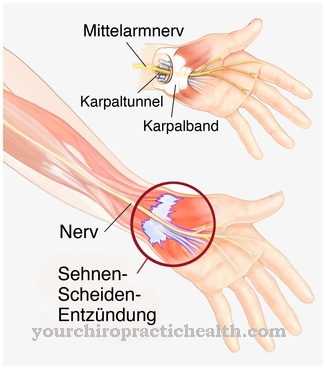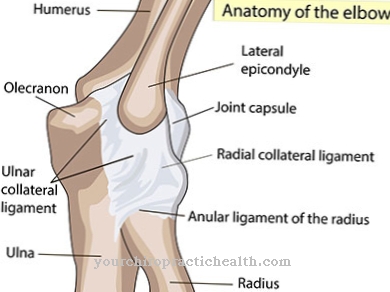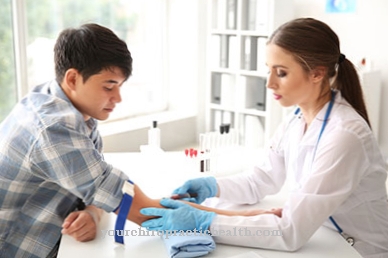Embryopathies are all malformations of the embryo that result from harmful influences in the early phase of pregnancy. The most popular Embryopathies are infectious, luxury food and drug embryopathies. Symptoms and their treatment depend on their severity.
What is embryopathy?

© sianstock - stock.adobe.com
Embryopathies are congenital diseases and malformations that go back to various disorders in early embryonic development. Above all, developmental disorders up to the eighth week after fertilization and thus about the tenth week of pregnancy are summarized as embryopathies. Up until this point, the unborn child is particularly sensitive.
Since the organs develop specifically in this development phase, harmful influences can even lead to a miscarriage, depending on the degree of exposure up to this point in pregnancy. In the case of embryopathy, the embryo does not die despite damage, but is born with differently pronounced malformations.
Embryopathy must be differentiated from so-called fetopathy. Fetopathy is also caused by prenatally damaging influences, which, however, affect a later development phase. Depending on their exact cause, embryopathies are further subdivided, for example into alcohol, tobacco or thalidomide-thalidomide embryopathy.
causes
The causes of embryopathies are divided into four larger groups. The first of these are infectious diseases affecting the mother in early pregnancy. This group is the most well-known group of embryopathies and includes, for example, the harmful effects that maternal infections with rubella, calendula, chickenpox or listeriosis, cytomegaly and toxoplasmosis show on the fetus.
Infections with herpes simplex or the Epstein-Barr virus can be just as harmful as these. The second group of embryopathies is developmental disorders due to the influence of drugs, such as those that occurred in the Contergan scandal. Chemicals and stimulants can also cause embryopathies, for example in the fetal alcohol syndrome or the lead child phenomenon.
In addition, the mother's age, weight, diet and any illnesses affect the development of the embryo in early pregnancy. Diabetes mellitus and thyroid dysfunction or phenylketonuria and heart defects are associated with an increased risk of embryopathies.
The same goes for malnutrition. In addition, ionizing radiation such as X-rays or radioactive radiation can damage the embryo during pregnancy. Some genetic diseases are still favored by embryopathies in their outbreak.
Symptoms, ailments & signs
Children with embryopathies can show a wide variety of symptoms. The degree of expression depends on the severity and duration of exposure to the harmful influences. For example, rubella embryopathy is typically associated with heart defects, cataracts, and deafness.
In addition, the affected newborns are often underweight, impaired in their cognitive development or have a relatively small head. Diabetic embryopathies are also associated with heart defects. In addition, the children often show congenital kidney malformations and skeletal dysplasias.
Alcohol embryopathy changes the appearance of children and causes, for example, narrow red lips, a flattened philtrum, dimples in the upper lip, sloping eyelid axes and a small head circumference. The most serious symptom in this context is above all the cognitive developmental delay of the children concerned.
Heart defects are also not atypical. Thalidomide embryopathy, on the other hand, causes missing auricles and paralysis of the facial nerve. In addition, malformations of the arms, legs, and thumbs and narrowing of the rectum can be characteristic symptoms.
diagnosis
Most embryopathies can be diagnosed by visual diagnosis immediately after the child is born. In order to get a more precise picture of the individual symptoms, the doctor uses imaging procedures and consults doctors and examinations from all disciplines. The anamnesis can provide information about the cause of the malformations, for example about an infection of the mother during pregnancy.
However, especially in the case of embryopathies due to drug, alcohol or drug abuse, mothers are often careful not to give the doctor information in the anamnesis. For some embryopathies, the cause cannot yet be established.
Complications
Various complications can arise with embryopathy. These mainly depend on the cause of the embryopathy and which substances the mother added to the body during pregnancy. As a rule, however, malformations occur in the child, which can affect both psychological and physical characteristics.
Often the abuse of alcohol, drugs, cigarettes or medication leads to a heart defect in the child. The child may also be deaf or born with a cataract. However, Genoa cannot be predicted which complications will apply to the child.
Malformations of the kidneys and the brain can also occur. Due to the malformations in the brain, the child is often motor restricted and suffers from mental retardation. The development of the child can also be slowed down considerably by embryopathy, so that the person affected will have to rely on the help of other people in his or her life.
Embryopathy cannot be treated until after birth and it is not possible to treat all symptoms. Malformations and heart defects are usually treated surgically immediately after birth. Developmental disorders can only be limited with the help of therapies. Often the parents are also psychologically burdened by the symptom.
When should you go to the doctor?
To avoid complications, children with embryopathy should be examined by a pediatrician at regular intervals. Additional visits to the doctor are required if symptoms arise. If, for example, signs of deafness or visual disturbances are noticed, this requires rapid medical clarification.
In the event of serious complications, it is best to call an emergency doctor. Children who suffer from kidney malformation or other damage to organs or the skeleton due to embryopathy should be taken to a specialist doctor.
In the best case scenario, a malformation of the embryo is detected during pregnancy. Children whose mothers had an infectious disease in early pregnancy are particularly affected. Diabetes mellitus, thyroid dysfunction and heart defects are also typical risk factors.
Mothers who belong to these risk groups should arrange an ultrasound examination at an early stage in order to be able to rule out embryopathy and to be able to take suitable preparatory measures in the event of a malformation. A medical diagnosis and treatment of the embryopathy is required in any case.
Doctors & therapists in your area
Treatment & Therapy
The therapy for embryopathy depends on the symptoms in the individual case. As a rule, the correction of vital organs is the focus of therapy. Since heart defects are often present, malformations of the limbs are initially neglected. Heart defects are first carefully examined by the doctor to ensure that they can be corrected.
If a correction by a heart operation is not possible or not absolutely necessary, those affected usually receive drug treatment that supports their heart work. Malformations of the kidneys can also be life-threatening. Severe kidney malformations require dialysis treatment, which regularly removes toxins from the patient's blood.
For both severe heart defects and severe kidney abnormalities, organ transplantation is the only possible option after a certain point in time to permanently cure the patient's symptoms. If there are only malformations of the limbs, these are also treated surgically in most cases.
With prostheses and endoprostheses, extensive options are available in this context that can make everyday life easier for patients. In the case of cognitive impairments in particular, early therapeutic support is indicated, which can support the cognitive development of the children concerned.
Outlook & forecast
Embryopathies very often lead to an early miscarriage, which the woman often does not even recognize as such. The woman experiences a bleeding that is only noticeable because it is more severe than a menstrual period and can be painful. In the event of a miscarriage, the affected woman must be examined by a doctor to determine whether the lining of the uterus is completely gone.
If there is still something in the uterus, dangerous infections that are similar to puerperal fever and are at least as dangerous can otherwise occur. To prevent this, the uterus may have to be scraped off.
If the embryopathy does not lead to a miscarriage and the embryo survives the first few weeks of pregnancy, it is born with more or less severe malformations that are difficult to predict. In such cases, affected parents still have the option of aborting the child after the 12th week of pregnancy if they do not want to expect such a life.
However, this is a very personal and, above all, difficult decision that takes time. The likely damage to health is difficult to assess this early in pregnancy. The more it progresses, the more it becomes apparent what the embryopathy has left behind in the child and what life awaits them when they are born.
prevention
Preventing embryopathies as much as possible is the responsibility of the expectant mother. All harmful effects on the child should be avoided as far as possible, such as X-ray examinations, alcohol consumption or tobacco consumption. In addition, the mother should prevent infections before pregnancy, if vaccinations are available.
In certain cases, medication cannot be discontinued. In these cases, the mother must either accept the risk of embryopathy or decide against having her own child at the present time.
Aftercare
With embryopathy, the options for follow-up care are very limited. First of all, an early diagnosis with rapid treatment is very important in order to prevent or limit further complications or complaints. The treatment of embryopathy itself is usually based on its degree of difficulty.
In most cases, the symptoms of embryopathy are treated by various surgical interventions. After these interventions, the person concerned must always rest and take care of his body. Exercise or other stressful and physical activities should be avoided in order not to unnecessarily burden the body. Since embryopathy can also lead to severe psychological disorders or depression, appropriate treatment should also be carried out by a psychologist.
Your own family or friends can also provide good support and help to those affected if such a doctor has problems. The development of the affected children should also always be encouraged. Various exercises can also be carried out in your own home so as not to slow down the development. It cannot be universally predicted whether embryopathy will lead to a reduced life expectancy for the person affected.
You can do that yourself
Since embryopathies are caused by harmful influences in the early stages of pregnancy, the most effective self-help measure is prevention.
Most often, an embryo is damaged by alcohol, tobacco and other drugs, as well as medication and certain infectious diseases. Women who often and happily consume alcohol and cigarettes should clarify before pregnancy whether they really want to and can give up these luxury foods for a longer period of time. It is best for affected women to start abstaining from consumption before trying to become pregnant.
Medicines, even over-the-counter, should only be taken during pregnancy after consulting a doctor. If it is not advisable to dispense with medication, a pregnancy should be postponed; if you are permanently dependent on medication, it should be reconsidered. Infectious diseases cannot be reasonably prevented during pregnancy. However, vaccinations are possible against certain pathogens that are particularly dangerous during pregnancy, such as the rubella virus.
Which self-help measures can be taken after the birth of the child depends on the type of malformation. If the skeleton or internal organs are damaged, numerous surgical interventions are usually necessary shortly after birth or in early childhood. This not only stresses the patient, but also the parents and family members. In this situation, those affected should not be afraid to seek the help of a therapist.



.jpg)
.jpg)

.jpg)




















